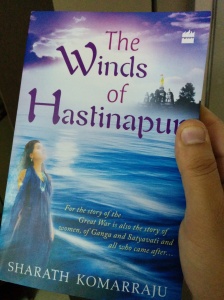Have you guys been enjoying the current Mahabharat Series on Star Plus? (It is about to end, by the way). Have you been missing the posts here? Yes, there might be a correlation. Personally, I am relishing the series, enjoying reading a few books, so you can say I am more in a receptive mode these days. Also, have been busy with my kartavya (read office work) which hasn’t allowed me to post here in some time. But some things need a mention, especially the one in the first sentence of the next paragraph.
I came across this book named the “Winds of Hastinapur” by Sharath Komarraju some time back and as is the case with every epic-based book I come across, buying it was a snap decision. Took me some time to begin reading though, considering my rate of buying books is always greater than my rate of reading them. I have always regretted this fact, and very heavily especially this time when I completed WOH (taking the liberty of using the acronym).
In the times when feminism is gaining traction in our country (mostly on social media yet hardly in action), WOH becomes one good selection if you want to read something about the Mahabharata. Being a man, Sharath has written this book from the point of view of women, and has done a fantastic job of thinking from not one but from the perspective of multiple women who dominate different chapters of the epic at different points (I can only wonder how a young lad can manage to think from so many women’s perspective in the first place).
The book starts the story of Mahabharata from Ganga and goes to first explain in detail the curse of the 8 vasus (summary here) and then Ganga’s emotions about the idea of being the savior for the vasus from the curse. The latter half of the book is through the lens of Matsyagandha/Satyavati or Kali as you would call her and the details of her desire and almost brutal ambitions. Reading Ganga’s side of the story might appear slightly fantastical while Satyavati appears highly relatable, something that should be obvious as Satyavati resembles more of a common man (no gender hint intended) while Ganga is seen as a goddess (by which I mean not being dominated by inferior emotions as much as humans are). When you consider this factor, the contrast makes total sense.
The author makes you dive rather deeply into the waters of Ganga when he talks about her emotions and you also feel that you are walking with the winds of Hastinapur in your face while reading the book when he mentions the story of Satyavati. In terms of writing, Sharath has mastered the art of making the reader imagine just what is required to understand and relate to the story well. Caveat: If you know nothing about the Mahabharata, beginning your journey of the epic from this book can be similar to beginning your cricket coaching directly from the Master Blaster. But in case you have undergone preliminary lessons, there are high chances you’re going to love it. You will still require some patience though, because you would have not thought from Ganga’s or Satyavati’s point of view so much ever before and while reading these details the impatient-for-the-masala-moments readers might want to ask – “OK, then?”. At many points in the book you would want to pause and think about what was just mentioned and say “Wow” to yourself because that thought probably never occurred to you before. Narration from Ganga and Satyavati is something that makes this book unique as most retellings have been from an external point of view or at max from the main characters’ point of view (eg., Palace of Illusions or Mrityunjaya).
I happen to know for a fact that the next book in the series will be from the point of view of Amba, Kunti and Gandhari something that should be even more interesting to read as their characters and decisions have always been deemed more controversial or difficult.
Hope you guys cross this book some day during your journey of gaining wisdom through the Mahabharata.
Happy Reading!
P.S. Please feel free to comment below on how you find the book or what you think about the review.

